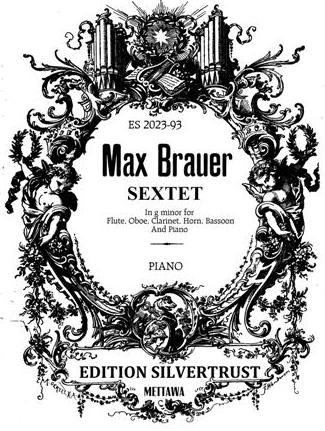Presents
Max Brauer
Sextet in g minor for Flute, Oboe, Clarinet, Horn, Bassoon & Piano
 Max
Brauer (1855-1918) was born in the German city of Mannheim. His initial studies
were in that city with Vinzenz Lachner, the city music director. Brauer
subsequently enrolled in the Cologne Conservatory where he studied piano and
composition with Ferdinand Hiller, Gustav Jensen and Samuel de Lange. After
graduating, he obtained the position of City Music Director of Kaiserslautern
which he held for two decades. Around 1905, he moved to Karlsruhe where he
founded and became director of the Bach Choral Society, a position he held until
his death. He composed in most genres , including opera, orchestra music,
sonatas and chamber music, among which was a string quartet and this Sextet for
Piano and Winds, neither of which were published during his lifetime.
Max
Brauer (1855-1918) was born in the German city of Mannheim. His initial studies
were in that city with Vinzenz Lachner, the city music director. Brauer
subsequently enrolled in the Cologne Conservatory where he studied piano and
composition with Ferdinand Hiller, Gustav Jensen and Samuel de Lange. After
graduating, he obtained the position of City Music Director of Kaiserslautern
which he held for two decades. Around 1905, he moved to Karlsruhe where he
founded and became director of the Bach Choral Society, a position he held until
his death. He composed in most genres , including opera, orchestra music,
sonatas and chamber music, among which was a string quartet and this Sextet for
Piano and Winds, neither of which were published during his lifetime.
The Sextet for Piano and Winds in g minor was published in 1920 by Breitkopf and Hartel, two years after his death. However, based on our research, we believe it was composed around 1895, a time when he was actively composing sonatas and chamber music. The big opening movement, Allegro, begins in a genial and leisurely fashion. There is something symphonic about this gorgeous music. The lively and playful second movement, Allegretto, is a cross between an intermezzo and a scherzo with some beautiful, lyrical slower sections presenting a fine contrast. The third movement, Andante, begins with a long solo for the horn with the piano subtley providing the background. Once the others join in, an appealing pastorale is presented, with a sudden animato section. The finale, Allegro con fuoco, bursts out of the gate with explosive energy. Several fine themes are presented one after the other. Again, it almost sounds like a symphony.
One can understand why Breitkopf and Hartel chose to publish this work by a relatively little known composer after his death. They must have realized upon obtaining the manuscript that it was a masterwork. All of the instruments are blended beautifully and the piano is just one of six, not a soloist, and in no way dominates affairs. We cannot recommend this work enough both for concert performance and to amateur ensembles.
Parts: $49.95